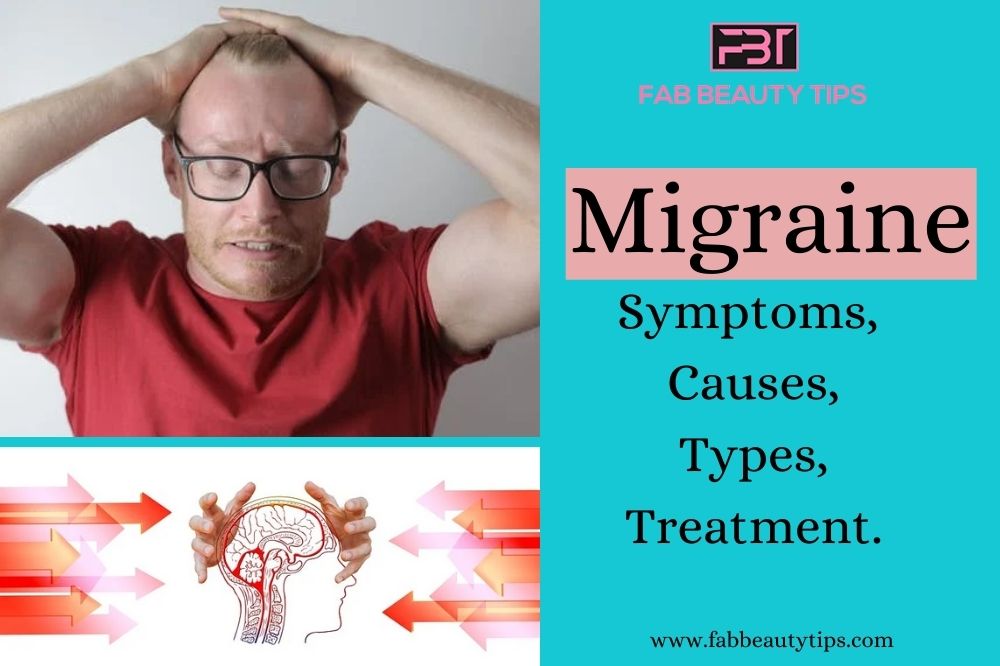Migraine is a severe, recurring, and painful headache. A Migraine is a primary headache disorder characterized by recurrent headaches that are moderate to severe. The headaches affect one half of the head and are pulsating in nature, and last from two to 72 hours.
Migraine: Symptoms, Causes, Types, Treatment
In This Article
Basic Symptoms of Migraine
Symptoms can start a while before the headache, immediately before the headache, during the headache, and after the headache. Although not all migraines are the same, typical symptoms include:
- Nausea
- Vomiting
- Sensitivity to light
- Sound
- Smell
Other Symptoms of Migraine
- Moderate to severe pain, usually confined to one side of the head but capable of occurring on either side of the head
- Severe, throbbing, or pulsing pain
- Increasing pain during physical activity or when straining
- Inability to perform regular activities due to pain
- Feeling sick and physically vomiting
- Increased sensitivity to light and sound, relieved by lying quietly in a darkened room.
Causes of Migraines
The causes are not yet known. It is suspected that they result from abnormal activity in the brain. This can affect the way nerves communicate as well as the chemicals and blood vessels in the brain. Thus, genetics may make someone more sensitive to the triggers that can cause migraines.
- Hormonal changes
Women may experience migraine symptoms during menstruation, due to changing hormone levels.
- Emotional triggers
Stress, depression, anxiety, excitement, and shock can trigger a migraine.
- Physical causes
Tiredness and insufficient sleep, shoulder or neck tension, poor posture, and physical overexertion are linked to migraines. Also low blood sugar and jet lag can also act as triggers.
- Triggers in the diet
Alcohol and caffeine can contribute to triggering migraines. Some specific foods can also have this effect, including chocolate, cheese, citrus fruits, and foods containing the additive tyramine. Also, irregular mealtimes and dehydration are named as potential triggers.
- Medications
Some sleeping pills, hormone replacement therapy (HRT) medications, and the combined contraceptive pill have all been named as possible triggers.
- Triggers in the environment
Flickering screens, strong smells, second-hand smoke, and loud noises can set off a migraine. Stuffy rooms, temperature changes, and bright lights are also possible triggers.
Types of migraine
There are two main types and its classification depends on whether the individual experiences any disturbances of the senses leading up to a migraine.
1.Migraine with aura
Migraine with aura represents a blurred hue around a tree. This picture is an illustration of what a person experiencing migraine with aura might see. For many people with migraines, the auras act as a warning, telling them that a headache is soon to come.
The effects of an aura can include
- Confusing thoughts or experiences
- The perception of strange, sparkling or flashing lights
- Zig-zagging lines in the visual field
- Blind spots or blank patches in the vision
- Pins and needles in an arm or leg
- Difficulty speaking
- Stiffness in the shoulders, neck, or limbs
- Unpleasant smells
2. Migraine Without Aura
More commonly, a person will experience a migraine without any sensory disturbance leading up to the attack. Between 70 to 90 percent of migraines occur without an aura.
Other types
There are other types of migraine related to specific syndromes or triggers which includes:
- Chronic
This refers to any migraine that triggers attacks on over 15 days of the month.
- Menstrual
This is when the attacks occur in a pattern connected to the menstrual cycle.
- Hemiplegic
This causes weakness on one side of the body for a temporary period.
- Abdominal
This is a syndrome that connects migraine attacks to irregular function in the gut and abdomen. It mainly occurs in children under 14 years of age.
- Migraine with brainstem aura
This is a rare type that can trigger severe neurological symptoms, such as affected speech.
Treatment of Migraine
- Medications
Migraines are often managed through a course of medication. There are many different types of migraine medication, including painkillers. One should take painkillers early in the progress rather than allowing the headache to develop.
Over-the-counter (OTC) medications effective for treating migraines include:
- Naproxen
- Ibuprofen
- Acetaminophen
- Other painkillers, such as aspirin with caffeine and acetaminophen, can often stop the headache or reduce pain.
- Drugs that treat nausea
Metoclopramide uses are to control nausea and vomiting. Serotonin agonists, such as sumatriptan, is also prescribed for severe migraines or for migraines that do not respond to OTC medications.
- Preventive medications
Its prevention begins with avoiding triggers. The main goals of preventive therapies are to reduce the frequency, pain level, and duration of headaches and also increases the effectiveness of other therapies.
Some several medications and supplements which help to prevent migraine attacks
- Antidepressants
- Magnesium citrate
- Vitamin B-12 supplements
- Riboflavin
Do leave your comment below and let me know if you have a migraine problem also share it with your friends
Thank You.
Disclaimer: Please note that This article is for informational purposes only and does not constitute medical advice. The information provided above is not a substitute for any professional medical advice. We always suggest you talk to your doctor about the risks and benefits of any treatment.

Neha is an Ayurvedic doctor based in Mumbai. She has completed Bachelors in Ayurvedic Medicine and Surgery (BAMS) and certified course in Cleansing Therapy. She believes that the treatment of a patient should not only be done with medicines but it also requires moral support along with the trust of the patient in you and your methods of treatment. The patient’s preferences and needs should be the first priority.

